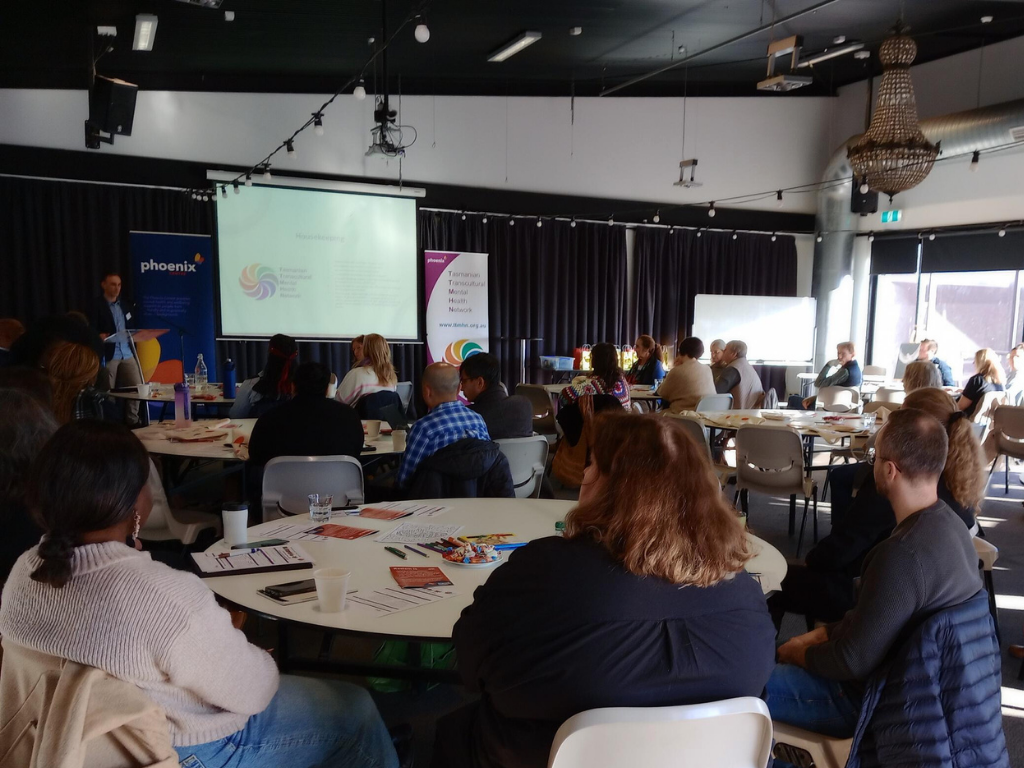This year’s Tasmanian Transcultural Mental Health Network (TTMHN), held in Launceston on the 26th of June, brought together a diverse range of professionals, community members, and others from across Tasmania to explore the impact of racism on mental health.
The diverse perspectives shared by our speakers throughout the day enriched our understanding of racism and it’s impact on mental health, and will undoubtedly improve our practice, and outcomes for the communities we serve.
Our day began with a very moving and grounding Welcome to Country by local Aboriginal Elder Delia Summers. The Welcome set the tone for cultural connection and engaging respectful reflection and dialogue throughout the day.
Warren Mason, a proud Indigenous artist, offered the network a powerful musical introduction that reminded us all of the power of story and healing through the Arts.
Errol Amerasekera, author of The Antiracist Organisation, delivered an opening keynote that challenged attendees to examine structural racism within their own organisations. Drawing from his extensive experience supporting organisations to create inclusive cultures and his background as a qualified psychotherapist, Errol provided concepts and practical frameworks for understanding and addressing systemic racism. His person-centric, trauma-informed approach resonated strongly with participants seeking actionable strategies for change and understanding in practice.
Dr. Catherine Muburi, a psychiatrist with Tasmania Statewide Mental Health Services, then presented compelling clinical perspectives on how racism impacts mental health care delivery. Her research-informed presentation on culturally responsive psychiatric care offered valuable insights, addressing the mental health impacts of racial discrimination from a clinical practice perspective.
A highlight of the day was the screening of “Our Story” by Students Against Racism – with an engaging Q&A session. The young people brought the forum to life with authentic voices, and the lived experience stories of young Tasmanians from refugee and migrant backgrounds. Their powerful short film shared personal experiences of racism and its direct and indirect impact on mental health. Providing these perspectives deeply moved all forum attendees and offered insights for practitioners working with diverse communities and young people.
Workshops
The afternoon workshops provided opportunities for practical application of the day’s learning. Errol Amerasekera led a workshop on “Addressing Racism in the Workplace”. Participants of this workshop were able to engage in deep discussions about differentiating systemic versus structural racism, understanding impacts, and developing organizational and strategies to combat racism through reflection and cultural humility.
The concurrent workshop led by Warren Mason demonstrated how art and storytelling can serve as powerful healing tools for trauma from racism, disposition and disconnection. Participants were invited to engage in experiential/hands-on exploration of healing through story, art and truth telling.
Reporting Racism
The day concluded with a presentation by Davan Ong from the Office of the Anti-Discrimination Commissioner. Dave presented on the importance of reporting racism and understanding our rights and responsibilities as practitioners. He provided the network with practical guidance on complaint processes, legal frameworks, and highlighted how reporting can support stronger systemic action against racism, and in turn support better mental health outcomes for those affected by discrimination.
Looking Forward
The success of this year’s forum, supported by the Tasmanian Government, reinforced the networks commitment to strengthening the cultural competency and cultural responsiveness of Tasmania’s mental health workforce. We look forward to continuing this important work and to seeing how the insights and connections from the Annual Forum will translate into positive change in our communities.
